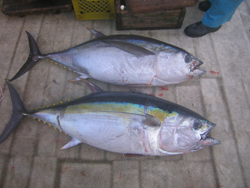Eastern Pacific Fishing Nations Fail to Conserve Tuna - July 1, 2008
Sea AnimalsRodney McInnis, Southwest Administrator of NOAA's Fisheries Service and U.S. Commissioner to the Inter-American Tropical Tuna Commission (IATTC), today expressed disappointment that a few countries blocked the Commission's plan to conserve depleted tuna stocks.
The IATTC's annual meetings concluded on Friday in Panama without agreement on a plan to conserve yellowfin and bigeye tuna, which have in recent years been subject to overexploitation. The Commission has responsibility for the conservation and management of these shared international fisheries resources, but measures can only be adopted if all Commission members agree.
"The IATTC has failed to take action at a critical juncture for the successful management of these tuna stocks," said Commissioner McInnis. "The United States certainly does not want to see a sharp decline of yellowfin and bigeye tuna stocks in the Eastern Pacific similar to the depletion and looming collapse of eastern Atlantic and Mediterranean bluefin tuna, but we fear that because the members of this Commission are failing to adopt a management regime supported by the best available science, we may be headed down that path in the near future."
Over the last several years, the Commission's staff scientists have consistently warned that reductions in fishing are necessary to maintain the abundance of yellowfin and bigeye tuna stocks at sustainable levels in the eastern Pacific Ocean. IATTC scientific staff recommended a 12-week closure of the purse seine fishery in the eastern Pacific Ocean, an off-shore area closure for the conservation of bigeye tuna, and reductions in allowable harvest levels of bigeye tuna by longline fishing vessels.

The overwhelming majority of IATTC member countries, including the United States, agreed in principle to a slate of measures consistent with the scientific staff's recommendations. However, consensus was blocked by a few member countries that cited uncertainty in the estimates of the status of the stocks and their unwillingness to accept significant fishing reductions.
Commissioner McInnis added, "We are extremely disappointed that despite the high quality of analyses and scientific research provided by IATTC scientists that indicates we must cut fishing levels, some countries cannot be convinced to follow their recommendations. Overfishing these tuna stocks could undermine the economic livelihood for many people and reduce supplies of sustainable yellowfin and bigeye tuna."
NOAA is dedicated to enhancing economic security and national safety through the prediction and research of weather and climate-related events and information service delivery for transportation, and by providing environmental stewardship of our nation's coastal and marine resources. Through the emerging Global Earth Observation System of Systems (GEOSS), NOAA is working with its federal partners, more than 60 countries and the European Commission to develop a global monitoring network that is as integrated as the planet it observes, predicts and protects.
 Deep Sea Crabs
Deep Sea Crabs